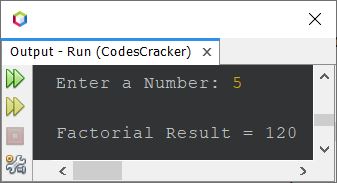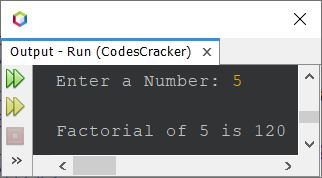- Java Basic Programs
- Java Programming Examples
- Java Print Hello World
- Java Get Input from User
- Java Print Integer
- Java Add two Numbers
- Java Check Even or Odd
- Java Check Prime or Not
- Java Check Alphabet or Not
- Java Check Vowel or Not
- Check Reverse equal Original
- Java Fahrenheit to Celsius
- Java Celsius to Fahrenheit
- Java Perfect Number Program
- Java Find Quotient Remainder
- Java Days to Seconds
- Java Count Digits in Number
- Java Binary Number Addition
- Java Discount Program
- Java Compute Courier Charge
- Java Find Telephone Bill
- Java Print ASCII Values
- Java Check Palindrome or Not
- Java Check Armstrong or Not
- Generate Armstrong Numbers
- Add two Numbers using Pointers
- Java Mathematical Programs
- Add Subtract Multiply & Divide
- Java Make Calculator
- Java Add Digits of Number
- Java Check Leap Year or Not
- Java Check Divisibility
- Java Find Simple Interest
- Java Find Compound Interest
- Java Print Fibonacci Series
- Java Find nCr nPr
- Calculate Average & Percentage
- Java Calculate Arithmetic Mean
- Java Calculate Student Grade
- Java Print Table of Number
- Java Print Prime Numbers
- Java Add n Numbers
- Java Interchange two Numbers
- Java Reverse Numbers
- Java Swap two Numbers
- Count Positive Negative & Zero
- Find Largest of two Numbers
- Find Largest of three Numbers
- Java Find Factorial of Number
- Java Find HCF & LCM
- Area & Perimeter of Square
- Area & Perimeter of Rectangle
- Area & Circumference of Circle
- Java Conversion Programs
- Java Decimal to Binary
- Java Decimal to Octal
- Java Decimal to Hexadecimal
- Java Binary to Decimal
- Java Binary to Octal
- Java Binary to Hexadecimal
- Java Octal to Decimal
- Java Octal to Binary
- Java Octal to Hexadecimal
- Java Hexadecimal to Decimal
- Java Hexadecimal to Binary
- Java Hexadecimal to Octal
- Java Pattern Programs
- Java Pattern of Stars
- Java Pattern of Alphabets
- Java Pattern of Numbers
- Java Pyramid of Stars
- Java Pyramid of Alphabets
- Java Pyramid of Numbers
- Java Print Diamond Pattern
- Java Print Floyd Triangle
- Java Print Pascal Triangle
- Java Array Programs
- One Dimensional Array Program
- Java Linear Search
- Java Binary Search
- Find Largest Element in Array
- Find Smallest Element in Array
- Java Reverse Array
- Insert Element in Array
- Delete Element from Array
- Java Merge two Array
- Java Bubble Sort
- Java Selection Sort
- Java Insertion Sort
- Java Find Common Elements
- Java Count Even/Odd Number
- Two Dimensional Array Program
- Java Add two Matrices
- Java Subtract two Matrices
- Java Transpose Matrix
- Multiply two Matrices
- Three Dimension Array Program
- Java String Programs
- Java Print String
- Find Length of String
- Java Compare two String
- Java Copy String
- Java Concatenate String
- Java Reverse String
- Delete Vowels from String
- Delete Words from Sentence
- Find Occurrence of a Character
- Java Find Occurrence of a Word
- Occurrence of Each Character
- Java Occurrence of Each Word
- Java Count Repeated Characters
- Java Count Repeated Words
- Java Capitalize Each Word
- Java Count Vowels/Consonants
- Java Extract Numbers
- Java Count Word in String
- Remove Spaces from String
- Java Sort a String
- Java Uppercase to Lowercase
- Java Lowercase to Uppercase
- Java Swap two Strings
- Java Check Anagram or Not
- Java Check Balance Parentheses
- Java Check Password Strength
- Java File Programs
- Java Read File
- Java Write to File
- Read & Display File Content
- Java Copy File
- Java Append Text to File
- Java Merge two File
- List files in Directory
- Java Delete File
- Java Miscellaneous Programs
- Generate Random Numbers
- Java Print Time & Date
- Java Get IP Address
- Java Shutdown Computer
- Java Programming Tutorial
- Java Tutorial
Java Program to Find the Factorial of a Number
This article covers a program in Java that finds and prints the factorial of a number. The factorial of a number n is calculated as n * (n-1) * (n-2) * ... * 1. For example, the factorial of 5 is 5*4*3*2*1 or 120.
Find the factorial of a number in Java using the for loop
The question is: write a Java program to find the factorial of a number. The number must be received by the user at the runtime of the program. The answer to this question is the program given below:
import java.util.Scanner; public class CodesCracker { public static void main(String[] args) { int num, i, fact=1; Scanner s = new Scanner(System.in); System.out.print("Enter a Number: "); num = s.nextInt(); for(i=num; i>=1; i--) { fact = fact*i; } System.out.println("\nFactorial Result = " +fact); } }
The sample run of the above Java program with user input 5 is shown in the snapshot given below:

The above program can also be created in this way:
import java.util.Scanner; public class CodesCracker { public static void main(String[] args) { int fact=1; Scanner s = new Scanner(System.in); System.out.print("Enter a Number: "); int num = s.nextInt(); for(int i=num; i>=1; i--) fact = fact*i; System.out.println("\nFactorial of " +num+ " is " +fact); } }
Here is its sample run with the same user input as the previous program's sample run:

Find the factorial of a number in Java using the while loop
This program does the same job as the previous one, but was created using the while loop instead of the for
import java.util.Scanner; public class CodesCracker { public static void main(String[] args) { int fact=1; Scanner s = new Scanner(System.in); System.out.print("Enter a Number: "); int num = s.nextInt(); int i = num; while(i>=1) { fact = fact*i; i--; } System.out.println("\nFactorial of " +num+ " is " +fact); } }
The above program produces the same output as the previous program. In the above program, the following two statements:
fact = fact*i; i--;
can also be replaced with a single statement given below:
fact = fact*i--;
In the above statement, the i-- means the current value of i gets used and then decremented because of a post-increment (--) operator used.
Find the factorial in Java using a function
This program is created using a user-defined function named factorial() that takes an argument and returns the factorial result of its argument.
import java.util.Scanner; public class CodesCracker { public static void main(String[] args) { Scanner s = new Scanner(System.in); System.out.print("Enter a Number: "); int num = s.nextInt(); System.out.println("\nFactorial of " +num+ " is " +factorial(num)); } public static int factorial(int n) { int fact = 1; for(int i=n; i>=1; i--) fact = fact*i; return fact; } }
Find the factorial of a number in Java using recursion
Here is another Java program I've created to find the factorial of a number using recursion, or a recursive function. A recursive function is a function where the function calls itself from inside its definition.
import java.util.Scanner; public class CodesCracker { public static void main(String[] args) { Scanner s = new Scanner(System.in); System.out.print("Enter a Number: "); int num = s.nextInt(); System.out.println("\nFactorial of " +num+ " is " +factorial(num)); } public static int factorial(int n) { if(n>=1) return (n * factorial(n-1)); else return 1; } }
Again, the output produced by this Java program is the same as that of the previous program.
Same Program in Other Languages
« Previous Program Next Program »